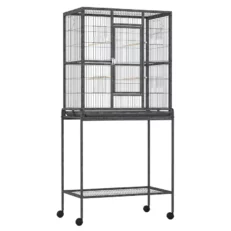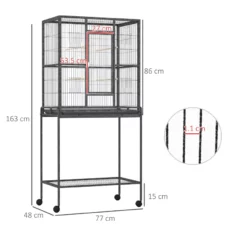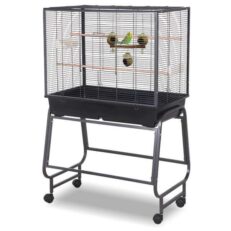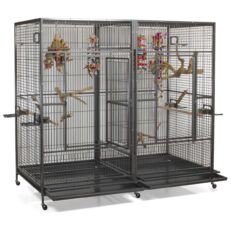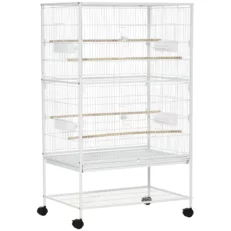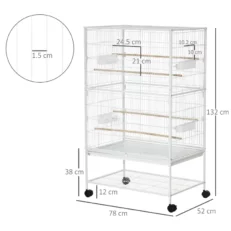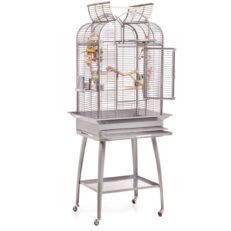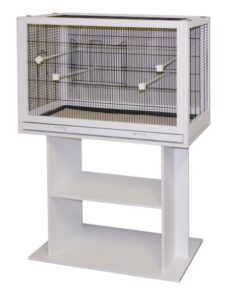
Parrots, with their incredible intelligence and sociable nature, can make delightful pets, enriching your home with their vibrant colors and melodic songs. However, catering to their unique needs and constructing a secure environment necessitates significant commitment and meticulous attention to detail. As part of your commitment, it’s essential to supply your feathered companion with adequate nutrition, ample opportunities for socialization, and sufficient exercise. Yet, beyond these basic needs, a crucial part of your responsibility involves ensuring that your home environment is safe and well-suited for your parrot.
In this comprehensive guide, we’ll delve deeper into the various measures you can implement to establish an optimal living space for your parrot. We’ll also discuss potential household dangers and how you can mitigate them to make your home a true sanctuary for your feathered friend. From choosing bird-friendly house plants to securing potential escape routes, every decision you make will contribute to the overall well-being of your parrot.
ENHANCE WINDOW AND DOOR SAFETY WITH SCREEN INSTALLATIONS
One of the paramount risks for parrots in a home environment is the possibility of them flying away. Characterized by their innate curiosity and energetic nature, parrots relish the opportunity to explore their surroundings. This exploration can unfortunately lead to an unintended flight through an open window or door. To effectively avert the risk of your parrot escaping, it’s vital to install screens on your windows and doors. These screens serve a dual purpose; they not only safeguard your parrot by restricting their exit but also facilitate the entry of fresh air and natural sunlight, vital elements for your bird’s well-being.
In my personal experience, my conure has a home that features a window screen installed in the living room and a screen for the balcony door at the rear of the house. This arrangement permits me to relish the comfort of fresh air flowing through my home, while simultaneously ensuring the security of my bird indoors.
OPT FOR TEFLON-FREE COOKWARE
Teflon is a popular non-stick coating frequently used in various types of cookware. Despite its advantages for cooking, Teflon can become a silent threat to the wellbeing of birds. When heated to elevated temperatures, Teflon can emit harmful fumes that are potentially lethal to avian species. Therefore, to safeguard your parrot’s health, it is crucial to use Teflon-free pots and pans when preparing meals. You can consider safer alternatives like stainless steel, cast iron, and ceramic cookware, which do not pose any risks associated with Teflon-coated products.
SELECT TEFLON-FREE HEATING APPLIANCES
Teflon, besides being prevalent in kitchen utensils, is often incorporated in various types of heaters as well. The same dangers apply here—when Teflon-coated heaters are in operation, they can release hazardous fumes that pose a threat to your parrot’s respiratory health. For the well-being and safety of your feathered companion, it’s paramount to opt for heaters that are free from Teflon. Safe alternatives include ceramic heaters and oil-filled radiators, which do not possess the risks associated with heaters coated with Teflon.
OPT FOR BIRD-FRIENDLY PLANTS
Numerous plant species can be toxic to birds, potentially resulting in serious health issues if consumed. In order to safeguard your parrot, it’s crucial to introduce plants into your home that are recognized as safe for birds. Some bird-friendly plants encompass spider plants, bamboo, and Boston ferns. However, every plant you plan to bring into your home should be thoroughly researched beforehand to confirm its safety for your avian companion. Ensuring that your houseplants are non-toxic not only creates a safe environment but also adds an enriching element for your feathered friend to explore.
REFRAIN FROM BURNING CANDLES
Candles, while soothing and aromatic to humans, can release harmful chemicals into the air when lit, which can negatively impact your parrot’s respiratory system. Besides, parrots are highly sensitive to intense odors and could experience stress or agitation in response to the fragrance of candles. To ensure the wellbeing of your parrot, it’s highly recommended to abstain from using candles within your living space. If you are seeking alternatives, consider flameless or battery-operated candles that do not produce harmful fumes or intense fragrances.
USE BIRD-SAFE CLEANING PRODUCTS FOR CAGE MAINTENANCE
Keeping your parrot’s habitat clean is pivotal in ensuring a healthy environment free from germs and harmful bacteria. However, it’s crucial to remember that certain cleaning agents can pose a threat to avian health. When it comes to maintaining your parrot’s cage, steer clear of cleaning products that contain potent chemicals, bleach, or ammonia as they can have detrimental effects on your parrot’s respiratory system.
Instead, opt for cleaning solutions that are deemed safe for birds. There are a range of bird-friendly cleaning products available in pet stores and online. Alternatively, you can utilize natural cleaning agents such as a mixture of vinegar and water. This combination is known for its effectiveness in cleaning and is generally safe for your feathered friend.
PLACE THE BIRD CAGE IN A SAFE, QUIET LOCATION
Your parrot’s cage location plays a crucial role in ensuring its safety and wellbeing. Keep the cage away from areas that might expose your parrot to drafts, direct sunlight, or hazards like unsecured windows and doors. Ideally, your parrot’s cage should be placed in a serene, quiet area, isolated from loud noises or other distractions that might cause stress or anxiety to your pet bird.
OFFER SAFE AND ENGAGING BIRD TOYS
Parrots are highly intelligent creatures, and they require continuous mental stimulation to maintain their health and happiness. Offering safe bird toys is an effective method to keep your parrot entertained and mentally engaged. However, choosing the right toys is key. Select toys that are safe, suitable for your bird’s size, and align with its temperament. Avoid toys with small detachable parts that can be swallowed or toys with strings or ropes that can potentially be a choking hazard.
IN CONCLUSION
In essence, taking the necessary steps to safeguard your home for your parrot is indispensable for their overall health and wellbeing. By creating a safe and comfortable environment within your home, you’re enabling your feathered friend to thrive and enjoy a fulfilling life.
Alongside implementing safety measures within your home, it’s also crucial to schedule regular health check-ups with a certified avian veterinarian. Parrots can be susceptible to certain health conditions, and regular vet visits can help identify any potential health issues at an early stage.
By adhering to the tips and guidelines outlined in this article, you’re taking significant steps towards ensuring your parrot’s safety, health, and happiness for the years to come.

